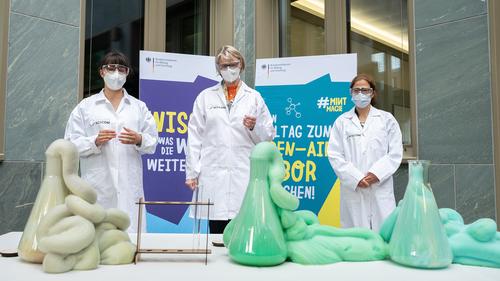Students Communicate Science
Chemistry student Charlotte Gerischer (left) and Federal Research Minister Anja Karliczek (center) present the “Elephant Toothpaste” demonstration experiment on the occasion of the #MINTmagie campaign.
Image Credit: BMBF
Start of The “Project Lab Science Communication” Funded by The Berlin University Alliance
News from Jul 14, 2021
In July 2021, the “Project Lab Science Communication” (Project-Sci.Com) kicked off with offers for students of all disciplines. In interdisciplinary teams, they implement their own ideas and enter into dialog with researchers and the public. Freie Universität Berlin, Humboldt-Universität zu Berlin, Technische Universität Berlin, and Charité – Universitätsmedizin Berlin as well as partners not affiliated with academia are involved in the alliance project. The project will be funded with a total of 600,000 euros over the next three years as part of the experimental science communication laboratories of the Berlin University Alliance (BUA).
Research plays a crucial role in finding solutions to global societal challenges such as the Covid-19 pandemic or climate change. This makes it all the more important to discuss issues with each other across disciplinary boundaries and to involve all sectors of society. In doing so, students can play a key role in mediating between researchers and society. This is where Project-Sci.Com comes in and funds student projects that present current research to the public.
Andrea Heilrath and Dr. Robert Richter, research assistants at Technische Universität Berlin, developed the innovative concept together with physicist Prof. Dr. Birgit Kanngießer. Researchers in the fields of physics, chemistry, didactics, and work studies from the universities in the Berlin Excellence Alliance are involved, as well as the University of the Arts, the non-profit association Experimental Stage Project e.V., the PARALLAX LAB initiative, and the Helmholtz-Zentrum Berlin (HZB), where students come into contact with research groups and gain insights into current research, including at the electron storage ring BESSY II.
Part of the alliance project are the teaching projects lab:prepare and lab:present, in which students develop their own research ideas and present them to the public – from classical scientific lectures to art installations. “Students learn the basics of good science communication and get the opportunity to try it out in practice in novel ways,” says Robert Richter. “After all, science communication not only requires dialog between researchers and society, but it is also the art of getting people excited about science.”
For example, Charlotte Gerischer, a master's student at Technische Universität Berlin and participant in the lab:present course, presented the “elephant toothpaste” demonstration experiment together with Federal Research Minister Anja Karliczek at a press conference held by the Federal Ministry of Education and Research (BMBF) on May 18 to mark the #MINTmagie campaign. The experiment illustrates how catalysts act and accelerate reactions. In this case, potassium iodide acts as a catalyst in the decomposition of hydrogen peroxide to oxygen and water, with the resulting gas causing the previously added rinsing agent to foam.
In the courses, students also gain insight into new production techniques and multimedia formats. “The professors involved offer an exciting variety of topics from innovative experimental methods, new materials, algorithms and computing, didactics of computer science, and participatory technology education,” says Andrea Heilrath. “In addition, the concept makes it possible to bring daily updated research out of the lab and into society.”
In addition to Prof. Birgit Kanngießer and Sebastian Praetz, doctoral candidate at the Institute of Optics and Atomic Physics, Prof. Liudger Dienel from the Center for Technology and Society, is part of the project management at Technische Universität Berlin. Prof. Ralf Romeike, head of the work group “Computing Education” at Freie Universität Berlin, is one of the project partners. Prof. Dr. Saskia Fischer and Prof. Dr. Jan Lüning from the Department of Physics at Humboldt-Universität zu Berlin are involved, the latter being scientific director at Helmholtz-Zentrum Berlin (HZB).
The Berlin University Alliance
The Berlin University Alliance is a consortium consisting of three major Berlin universities – Freie Universität Berlin, Humboldt-Universität zu Berlin, Technische Universität Berlin – and Charité – Universitätsmedizin Berlin, established to shape research and education in Berlin. The four partners joined forces to further develop Berlin as a research hub with international drawing power. Together the partners explore major societal challenges, increase public outreach, promote the training of junior researchers, address issues of quality and standards in research, and share resources in the areas of research infrastructure, teaching, diversity, equal opportunities, and internationalization. The Berlin University Alliance is funded by the Federal Ministry of Education and Research (BMBF) and the state of Berlin under the Excellence Strategy of the Federal Government and the Länder.
Joint press release from Freie Universität Berlin, Humboldt-Universität zu Berlin, Technische Universität Berlin along with Charité – Universitätsmedizin Berlin
Press contact
Hans-Christoph Keller, acting press spokesperson for the Berlin University Alliance and press spokesperson for Humboldt-Universität zu Berlin
Email: medien@berlin-university-alliance.de

